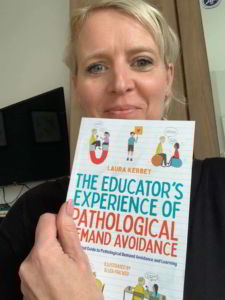Autism can present several challenges for both students and the school. This can also mean that attendance can be difficult to claw back for students, especially those who exhibit pathological demand avoidance (PDA). That’s why we must understand a child’s needs and find what will work best for them.
“276. Pupils with SEND have a range of different needs and starting points. Pupils will have unique, individual needs, even where their needs may fall under the same umbrella term, such as autism.”
 When supporting a child with autism or PDA, we must consider their needs, aspirations and how best they can absorb information. EDClass spoke to education consultant, author and founder of “Positive Assessments Support and Training (PAST)”, Laura Kerbey to discuss PDA and supporting children. Laura has a vast amount of experience in the education sector and she focuses on supporting children and teenagers with autism, particularly those with PDA. Laura said:
When supporting a child with autism or PDA, we must consider their needs, aspirations and how best they can absorb information. EDClass spoke to education consultant, author and founder of “Positive Assessments Support and Training (PAST)”, Laura Kerbey to discuss PDA and supporting children. Laura has a vast amount of experience in the education sector and she focuses on supporting children and teenagers with autism, particularly those with PDA. Laura said:
“The most important element of working with a child with a PDA profile is understanding why they experience anxiety and their need for autonomy. We must take the time to build up safe, trusted and meaningful relationships. The antidote to anxiety is trust, and the safer young person feels, the less anxious they will be.”
Building a strong connection with a child can allow them to feel confident in their learning. A child who feels safe can focus their attention on their education better than when they feel vulnerable, scared or anxious.
Everyone has a responsibility
Ultimately, the school is responsible for the safeguarding of a child and parents are responsible for ensuring their child attends education. However, there can be a collaborative approach to understand the barriers that need to be met and implement well-suited solutions.
“Code B: Off-site educational Activity
249. Attending an off-site educational activity that has been approved by the school and supervised by someone authorised by the school.”
Attendance can be claimed if due diligence is chosen and the provision chosen meets education and safeguarding requirements. Laura added:
“When a child, particularly with autism or PDA is accessing learning anywhere other than at home, they need to have at least one safe person in at least one safe place. This could be to ensure the child can access a provision where they feel comfortable and their autonomy is respected. We can’t put a child in a similar environment where it hasn’t worked for them, so it’s about respecting their autonomy too. It’s somebody that’s going to have to take the time to really build up that connection with them.”
It’s important to consider that everyone has a part to play in supporting a child with autism and PDA and raising attendance.
PDA and raising attendance
There can be no one-size-fits-all approach to solving mental health or attendance challenges. However, these three strategies could assist:
1. Flexible timetabling
“We need to look at a flexible child-led timetable. We must understand that some of these young people won’t be able to access learning for more than an hour a day. A child with PDA will feel autonomy when they can choose when to come in and how long they stay for, I think a hybrid model can work well.”
Using part-time timetables or adding flexibility can allow children to have more respect for their teachers and this can encourage them to engage in their education. Children also need to be engaged with their learning and see the value in what they are being taught otherwise it could be overwhelming for them.
2. Engaging parents
“Parent engagement is absolutely essential. Parents, teachers and professionals should provide collaborative support and mutually respect and understand each other. This will be more beneficial for a child with PDA than being in conflict.”
Having a good relationship with parents comes down to good communication and building a connection with trust. This could be something as simple as finding a more preferred communication style, such as email or WhatsApp, rather than a phone call or in-person meeting because some parents could be neurodivergent themselves.
3. Online learning
“Online learning can be so helpful. A lot of children can feel safer and access low-demand lessons and slowly build their confidence. We need to stop seeing being in the classroom as superior to being online, we need to see them as equal. Some children can also have extremely long journeys to school. I think it would be more inclusive to offer more online.”
The potential that online learning can deliver can be exceptional for some students. Being able to learn in a comfortable setting with support from qualified teachers can transform a child’s outlook on education. Celebrating the success and progress of a child can develop their confidence too.
If you would like to learn about EDClass and what an effective online alternative provision can do call 01909 568338, email mail@edclass.com or enquire for more information here.











